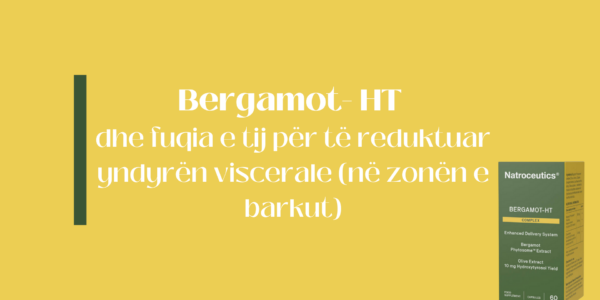
Hipotiroidizmi- Një qasje holistike për shëndetin e tiroides
Pikat Kyçe:
Tiroidja dhe Metabolizmi: Tiroidja rregullon metabolizmin përmes hormoneve T4 dhe T3, të cilët janë thelbësorë për prodhimin e energjisë (ATP).
Shenjat e Tiroides së Dobësuar (Hipotiroidizmi): Shtim në peshë, ulje të përqëndrimit, duar dhe këmbë të ftohta, kapsllëk, kolesterol i lartë, dhimbje muskujsh, menstruacione të rënda, ose zmadhim i gjëndrës tiroide.
Lëndë Ushqyese për Funksionin e Tiroides: Jodi, seleni, tirozina, vitaminat A, B, C, zinku dhe NAC mbështesin prodhimin dhe konvertimin e hormoneve tiroide dhe shëndetin e përgjithshëm të tiroides.
Tretja dhe Detoksifikimi: Zmadhimi i mukozës së zorrëve, tretja e dobët dhe toksina si fluori mund të pengojnë përthithjen e jodit dhe prodhimin e hormoneve tiroide.
Çrregullimet e tiroides prekin një në njëzet persona – a mund të jesh edhe ti një prej tyre?
Gjëndra tiroide është e vogël, por me ndikim të madh.
Ajo rregullon se sa shpejt mitokondritë tona prodhojnë adenozinë trifosfat (ATP), që është “monedha e energjisë” e trupit tonë. Kjo ndikon në metabolizmin dhe shëndetin e çdo sistemi të trupit. Hormonet kryesore janë tiroksina (T4) që mund të konvertohet në formën më aktive triiodotironinë (T3).
Çfarë është Hipotiroidizmi?
Nëse tiroidja funksionon ngadalë, si në hipotiroidizëm, ka shumë pak “karburant” për të mbajtur “energjinë” dhe metabolizmi ngadalësohet.
Çfarë është Hipertiroidizmi?
Nëse tiroidja funksionon tepër shpejt, si në hipertiroidizëm, ka shumë “karburant” dhe metabolizmi bëhet shumë i shpejtë.
Meqenëse hipotiroidizmi është shumë më i zakonshëm, do të fokusohemi në këtë gjendje.
Simptomat kryesore të tiroides së dobët (hipotiroidizëm):
-
- Shtim në peshë dhe vështirësi në humbje të peshës
- Mjegullsi në tru dhe përqëndrim i dobët
- Duar dhe këmbë të ftohta
- Kapsllëk
- Lodhje dhe energji e ulët
- Kolesterol i lartë
- Dhimbje muskujsh
- Menstruacione të rënda
- Nyje/Goitre (zmadhimi i tiroides)
Cilat lëndë ushqyese mbështesin funksionin e shëndetshëm të tiroides?
Mbështetja natyrale e tiroides fillon me sigurimin e lëndëve ushqyese që ajo ka nevojë. Jodi dhe tirozina janë baza për prodhimin e T4, të mbështetura nga hekuri, seleni dhe vitaminat A, B2, B3, B6 dhe C. Seleni, zinku dhe bakri ndihmojnë në konvertimin e T4 në T3. NAC (N-acetil cisteina) është një aminoacid i rëndësishëm që bashkohet me selenin për të formuar selenocisteinën, një antioksidant kyç për tiroiden dhe ndihmon prodhimin e glutation peroksidazës.
Tretja
Problemet me tretjen mund të jenë faktorë të rëndësishëm, veçanërisht në sëmundjet autoimune të tiroides si tiroiditi Hashimoto. Kjo lidhet shpesh me rritjen e përshkueshmërisë së zorrëve (“zorra që rrjedh”), e cila ndikohet nga gluteni, bakteret e paekuilibruara në zorrë, dhe stresi – sidomos nëse personi ka predispozitë gjenetike. Nëse ushqimi nuk tretet mirë ose kalon shumë shpejt nëpër zorrë, përthithja e lëndëve ushqyese bëhet më e vështirë.
Imuniteti
Vitamina D e ulët lidhet me sëmundje autoimune dhe mund të shkaktohet nga ekspozimi i ulët në diell dhe variante të veçanta të gjenit të receptorit të vitaminës D. Inflamacioni kronik – i nxitur nga përshkueshmëria e zorrëve, ushqimi i përpunuar dhe mungesa e gjumit – mund të ulë funksionin e tiroides.
Energjia dhe Sistemi Nervor
Sheqeri i lartë në gjak dhe stresi janë të zakonshëm në çrregullimet e tiroides. Kortizoli, hormoni i stresit, mund të pengojë lirimin e hormonit stimulues të tiroides (TSH) nga hipofiza. Ai gjithashtu favorizon formimin e “T3 të kundërt” (rT3), që bllokon funksionin e tiroides edhe nëse T4 është në nivele të mjaftueshme. Mosbalanca e glukozës në gjak dhe rezistenca ndaj insulinës gjithashtu ndikojnë negativisht në tiroiden.
Detoksifikimi
Halidet si fluori (nga uji i çezmës) janë të ngjashme me jodin dhe mund të pengojnë përthithjen e tij në tiroide. Toksina të tjera si metalet e rënda (p.sh. merkur nga plombat dentare) mund të pengojnë konvertimin e T4 në T3. Ekspozimi i lartë ndaj toksinave, dieta e dobët, stresi kronik dhe faktorët gjenetikë mund të çrregullojnë funksionin e tiroides.
Si të mbështesim tiroiden?
Shëndeti i përgjithshëm i trupit ndikon drejtpërdrejt në shëndetin e tiroides. Ky është “çelësi i artë” për të arritur ekuilibrin afatgjatë në çrregullimet e tiroides. Kjo përfshin sigurimin e këtyre lëndëve:
- Jodi
- Tirozina
- Seleni
- N-acetil cisteina (NAC)
- Vitamina A
- Vitamina C
- Zinku
Gjithashtu merrni në konsideratë:
- Mbështetje për tretjen (p.sh. probiotikë)
- Forcim të imunitetit (p.sh. vitamina D3)
- Stabilitet nervor (p.sh. magnez)
- Menaxhim të sheqerit në gjak (p.sh. krom)
- Detoksifikim (p.sh. glutation)
- Funksion të mirë të mitokondrive (p.sh. D-riboza)
Kujdesi për veten dhe fokusimi te lëndët kyçe ushqyese mund t’ju ndihmojë të mbani trupin dhe tiroiden në formë të mirë.
Referencat:
1. What we do. Accessed March 10, 2025. https://www.btf-thyroid.org/whatwedo
2. Short KR, Nygren J, Barazzoni R, James Levine A, Nair KS. T(3) increases mitochondrial ATP production in oxidative muscle despite increased expression of UCP2 and -3. Am J Physiol Endocrinol Metab. 2001;280(5). doi:10.1152/AJPENDO.2001.280.5.E761
3. Schomburg L, Köhrle J. On the importance of selenium and iodine metabolism for thyroid hormone biosynthesis and human health. Mol Nutr Food Res. 2008;52(11):1235-1246. doi:10.1002/MNFR.200700465
4. Ertek S, Cicero AFG, Caglar O, Erdogan G. Relationship between serum zinc levels, thyroid hormones and thyroid volume following successful iodine supplementation. Hormones. 2010;9(3):263-268. doi:10.14310/HORM.2002.1276/METRICS
5. Vanderpump MPJ. The epidemiology of thyroid disease. Br Med Bull. 2011;99(1):39-51. doi:10.1093/BMB/LDR030
6. Jones GD, Droz B, Greve P, et al. Selenium deficiency risk predicted to increase under future climate change. Proc Natl Acad Sci U S A. 2017;114(11):2848-2853. doi:10.1073/PNAS.1611576114/-/DCSUPPLEMENTAL
7. Duntas LH. The role of selenium in thyroid autoimmunity and cancer. Thyroid. 2006;16(5):455-460. doi:10.1089/THY.2006.16.455
8. Fasano A. Zonulin and its regulation of intestinal barrier function: the biological door to inflammation, autoimmunity, and cancer. Physiol Rev. 2011;91(1):151-175. doi:10.1152/PHYSREV.00003.2008
9. Fasano A. Zonulin and its regulation of intestinal barrier function: the biological door to inflammation, autoimmunity, and cancer. Physiol Rev. 2011;91(1):151-175. doi:10.1152/PHYSREV.00003.2008
10. Wang W, Uzzau S, Goldblum SE, Fasano A. Human zonulin, a potential modulator of intestinal tight junctions. J Cell Sci. 2000;113 Pt 24(24):4435-4440. doi:10.1242/JCS.113.24.4435
11. Farhadi A, Fields JZ, Keshavarzian A. Mucosal mast cells are pivotal elements in inflammatory bowel disease that connect the dots: Stress, intestinal hyperpermeability and inflammation. World Journal of Gastroenterology : WJG. 2007;13(22):3027. doi:10.3748/WJG.V13.I22.3027
12. Tomer Y. Genetic susceptibility to autoimmune thyroid disease: past, present, and future. Thyroid. 2010;20(7):715-725. doi:10.1089/THY.2010.1644
13. Décard BF, Von Ahsen N, Grunwald T, et al. Low vitamin D and elevated immunoreactivity against Epstein-Barr virus before first clinical manifestation of multiple sclerosis. J Neurol Neurosurg Psychiatry. 2012;83(12):1170-1173. doi:10.1136/JNNP-2012-303068
14. Simpson S, Blizzard L, Otahal P, Van Der Mei I, Taylor B. Latitude is significantly associated with the prevalence of multiple sclerosis: a meta-analysis. J Neurol Neurosurg Psychiatry. 2011;82(10):1132-1141. doi:10.1136/JNNP.2011.240432
15. Agliardi C, Guerini FR, Saresella M, et al. Vitamin D receptor (VDR) gene SNPs influence VDR expression and modulate protection from multiple sclerosis in HLA-DRB1*15-positive individuals. Brain Behav Immun. 2011;25(7):1460-1467. doi:10.1016/J.BBI.2011.05.015
16. Shi H, Kokoeva M V., Inouye K, Tzameli I, Yin H, Flier JS. TLR4 links innate immunity and fatty acid-induced insulin resistance. J Clin Invest. 2006;116(11):3015-3025. doi:10.1172/JCI28898
17. Carnethon MR, De Chavez PJD, Lauderdale DS, Carson AP, Liu K, Knutson KL. Abstract MP90: Association of Sleep Duration and Quality with Incident Diabetes: Coronary Artery Risk Development in Young Adults Sleep Study. Circulation. 2013;127(suppl_12). doi:10.1161/CIRC.127.SUPPL_12.AMP90
18. Benker G, Raida M, Olbricht T, Wagner R, Reinhardt W, Reinwein D. TSH secretion in Cushing’s syndrome: relation to glucocorticoid excess, diabetes, goitre, and the “sick euthyroid syndrome.” Clin Endocrinol (Oxf). 1990;33(6):777-786. doi:10.1111/J.1365-2265.1990.TB03915.X
19. Mancini A, Di Segni C, Raimondo S, et al. Thyroid Hormones, Oxidative Stress, and Inflammation. Mediators Inflamm. 2016;2016. doi:10.1155/2016/6757154
20. Tang Y, Yan T, Wang G, et al. Correlation between Insulin Resistance and Thyroid Nodule in Type 2 Diabetes Mellitus. Int J Endocrinol. 2017;2017. doi:10.1155/2017/1617458
21. Peckham S, Lowery D, Spencer S. Are fluoride levels in drinking water associated with hypothyroidism prevalence in England? A large observational study of GP practice data and fluoride levels in drinking water. J Epidemiol Community Health (1978). 2015;69(7):619-624. doi:10.1136/JECH-2014-204971
22. Chen A, Kim SS, Chung E, Dietrich KN. Thyroid hormones in relation to lead, mercury, and cadmium exposure in the National Health and Nutrition Examination Survey, 2007-2008. Environ Health Perspect. 2013;121(2):181-186. doi:10.1289/EHP.1205239
23. Antico A, Tampoia M, Tozzoli R, Bizzaro N. Can supplementation with vitamin D reduce the risk or modify the course of autoimmune diseases? A systematic review of the literature. Autoimmun Rev. 2012;12(2):127-136. doi:10.1016/J.AUTREV.2012.07.007
24. Abbasi B, Kimiagar M, Sadeghniiat K, Shirazi MM, Hedayati M, Rashidkhani B. The effect of magnesium supplementation on primary insomnia in elderly: A double-blind placebo-controlled clinical trial. J Res Med Sci. 2012;17(12):1161. Accessed March 13, 2025. https://pmc.ncbi.nlm.nih.gov/articles/PMC3703169/
25. Martin J, Wang ZQ, Zhang XH, et al. Chromium picolinate supplementation attenuates body weight gain and increases insulin sensitivity in subjects with type 2 diabetes. Diabetes Care. 2006;29(8):1826-1832. doi:10.2337/DC06-0254
26. Atkuri KR, Mantovani JJ, Herzenberg LA, Herzenberg LA. N-Acetylcysteine–a safe antidote for cysteine/glutathione deficiency. Curr Opin Pharmacol. 2007;7(4):355-359. doi:10.1016/J.COPH.2007.04.005
27. Teitelbaum JE, Johnson C, St. Cyr J. The use of D-ribose in chronic fatigue syndrome and fibromyalgia: a pilot study. J Altern Complement Med. 2006;12(9):857-862. doi:10.1089/ACM.2006.12.857








